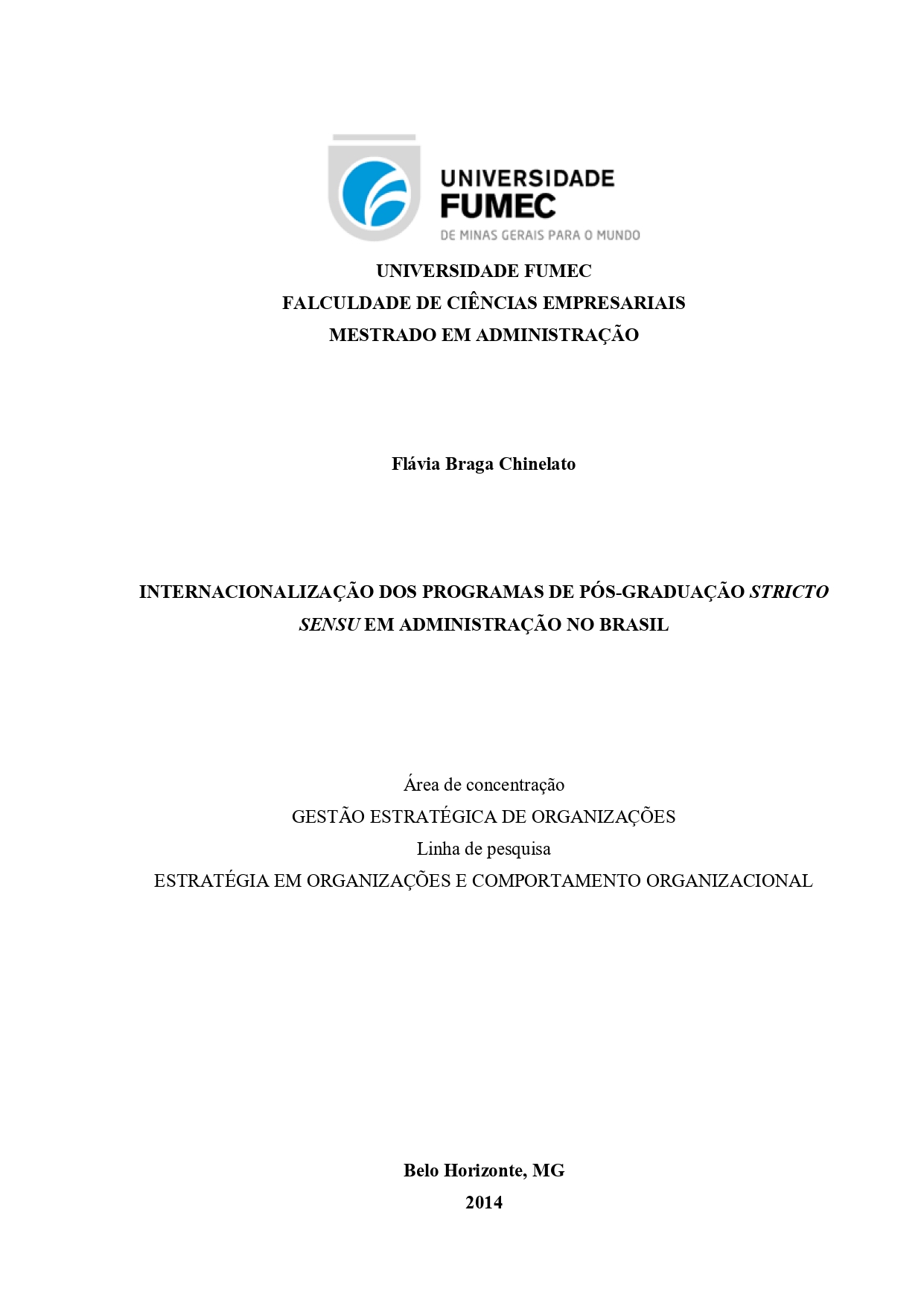Internacionalização dos programas de pós-graduação stricto sensu em administração no Brasil

Visualizar/
Data
2014Autor
Chinelato, Flávia Braga
xmlui.mirage2.itemSummaryView.MetaData
Mostrar registro completoResumo
A teoria da internacionalização é muito aplicada a empresas, entretanto é possível empregá-la também em outras áreas, como a de ensino. Com o crescimento da competitividade, as universidades precisam ampliar seu campo de atuação, e a internacionalização pode ser uma importante estratégia para auxiliá-las nesta tarefa. Neste contexto, há uma preocupação para que as instituições de ensino invistam na internacionalização, surgindo daí a necessidade de verificar se essa internacionalização tem conexão com o desempenho delas. Esta pesquisa enfoca os programas de pós-graduação stricto sensu em Administração avaliados no triênio 2010 a 2012 com notas 6 e 7 pela CAPES, os únicos considerados com elevado grau de internacionalização. Foram encontrados apenas quatro programas, a FGV-RJ e a UFMG com nota 6 e a FGV-SP e a USP com nota 7. O objetivo é verificar em que medida o grau de internacionalização desses programas reflete seu desempenho geral. A teoria de redes e a teoria da internacionalização embasaram o referencial teórico e articularemos dados coletados. A metodologia utilizada é a de métodos múltiplos, sendo que para a construção do banco de dados foram extraídas informações do site da CAPES e do currículo Lattes. Verificou-se que não há uma padronização na maneira como os programas informam suas ações de internacionalização. Foram analisadas a formação e o nível declarado de utilização de idiomas dos docentes vinculados aos programas selecionados e posteriormente a relação com publicações no exterior. Especificamente quanto aos indicadores de internacionalização, foi identificado que a USP é a instituição cujo programa em Administração possui o maior alcance no cumprimento dos indicadores propostos pela CAPES, sendo 34%, enquanto a FGV-RJ vem em segundo lugar com 32%, a FGV-SP em terceiro com 24% e a UFMG em último com apenas 10%. Percebe-se que não há um elevado alcance de cumprimento por todos os programas tampouco um equilíbrio entre eles. Dos quatorze indicadores propostos pela CAPES no total os quatro programas alcançaram apenas 10, o que corresponde a 71,5% dos indicadores. The theory of internationalization is very applied to companies, however it is also possible to apply it in other areas such as education. With the growth of competitive universities need to expand their field of expertise and internationalization can be an important strategy to assist in this task. In this context, there is a concern that educational institutions invest in internationalization and from that comes the need to verify that the internationalization of education has connection with their performance. This research focuses on the graduate studies program in Administration evaluated the triennium 2010-2012 with notes 6 or 7 by CAPES, the only considered with a high degree of internationalization. Only four programs, FGV-RJ and the UFMG with notes 6 and the FGV-SP and USP were found with notes 7 The objective is to verify to what extent the overall performance of the programs reflect the degree of internationalization of the same. We worked with the network theory and the theory of internationalization to support the theoretical framework and articulate with the data collected. The methodology used is that of multiple methods and the construction of the database information from CAPES and lattes resume site were extracted. It was found that there is no standardization in how programs inform their actions internationalization. Training and the declared level of use of language teachers connected to selected programs and subsequently the relationship with overseas publications were analyzed. Specifically as indicators of internationalization has been identified that the USP is the institution that has the program in Business Administration with the longest range in compliance with the indicators being 34%, while the FGV-RJ comes second with 32%, FGV-SP in third with 24% and the UFMG last with only 10%. It is noticed that there is a high achieving compliance by all programs and not a balance between them. Of the fourteen indicators proposed are achieved by Capes total of only four programs 10, which corresponds to 71.5%. It is necessary to expand the participation of these programs both internationally and strengthen networks of interaction between Brazil and abroad.
